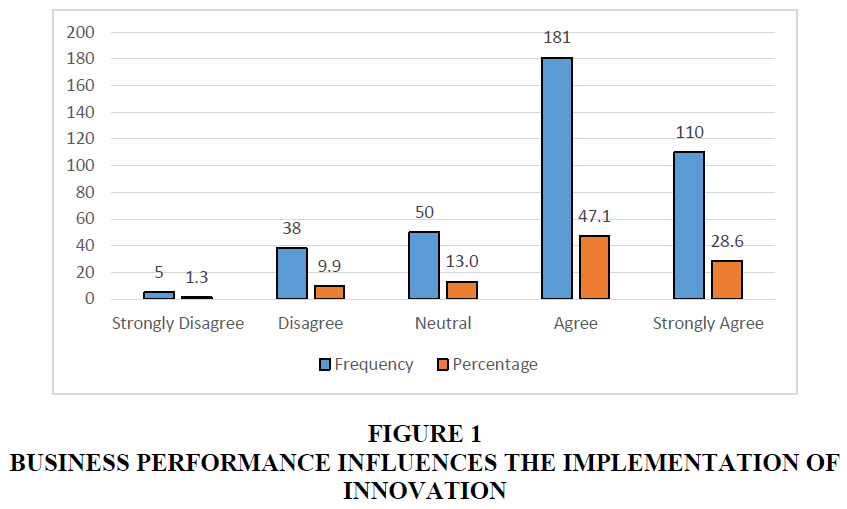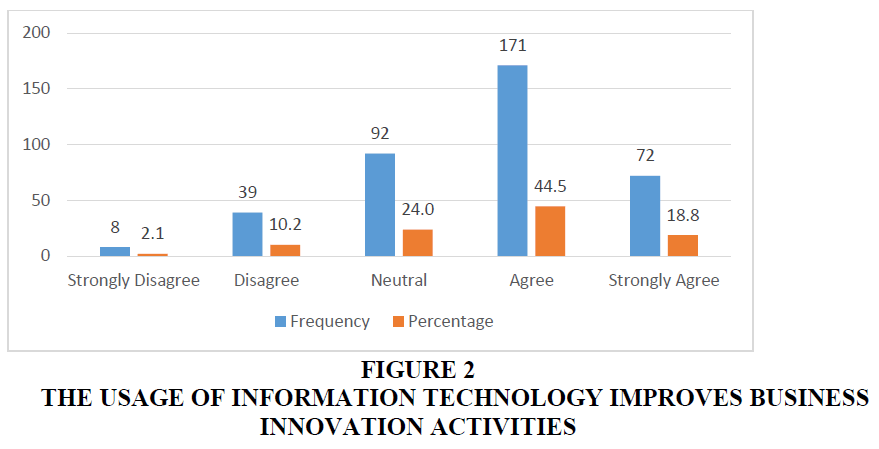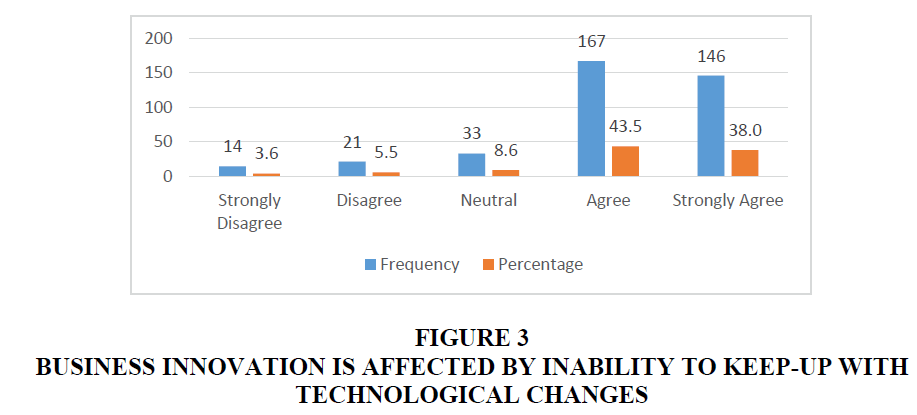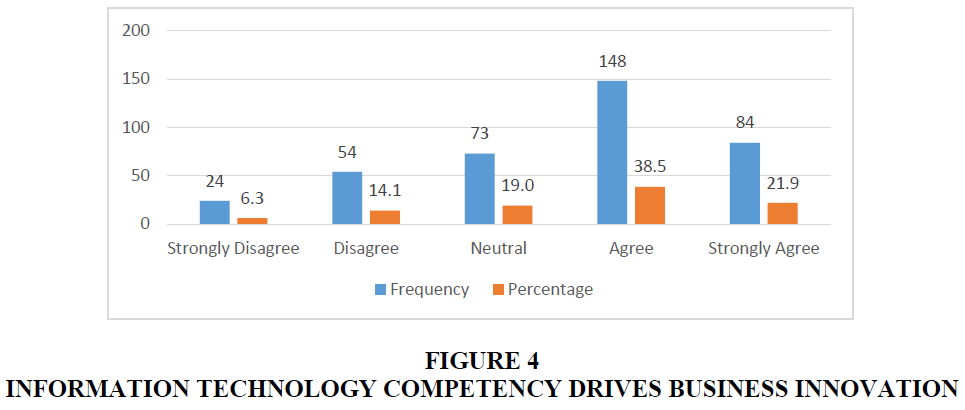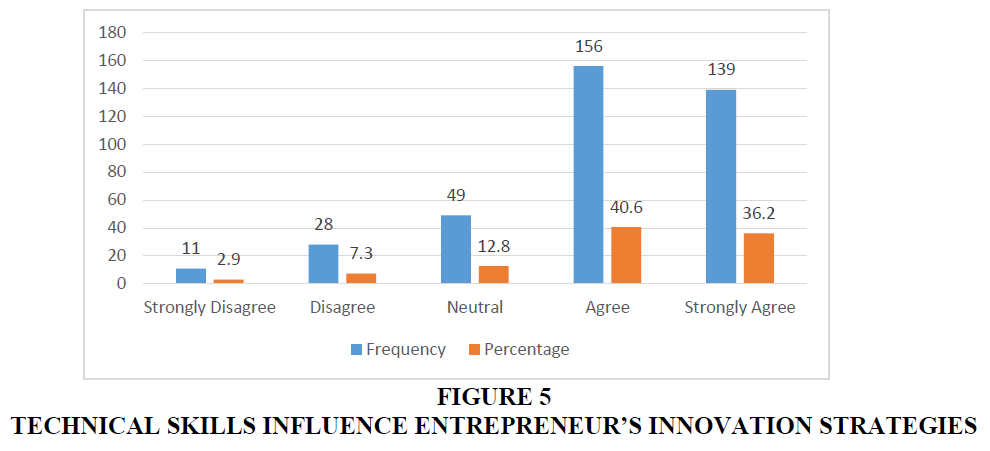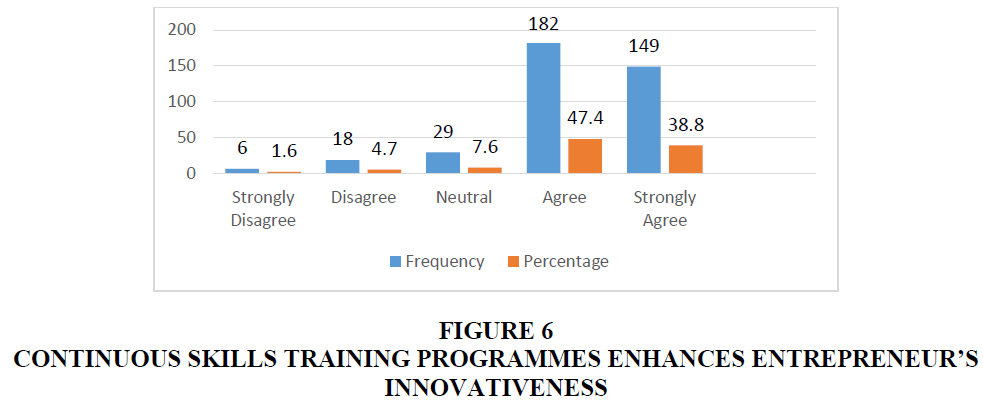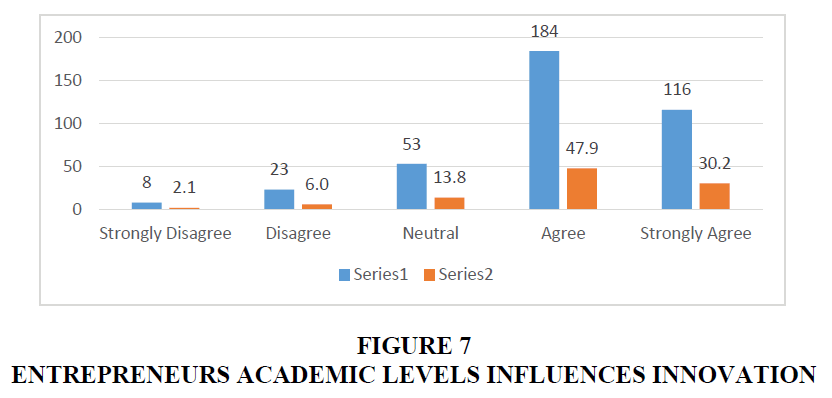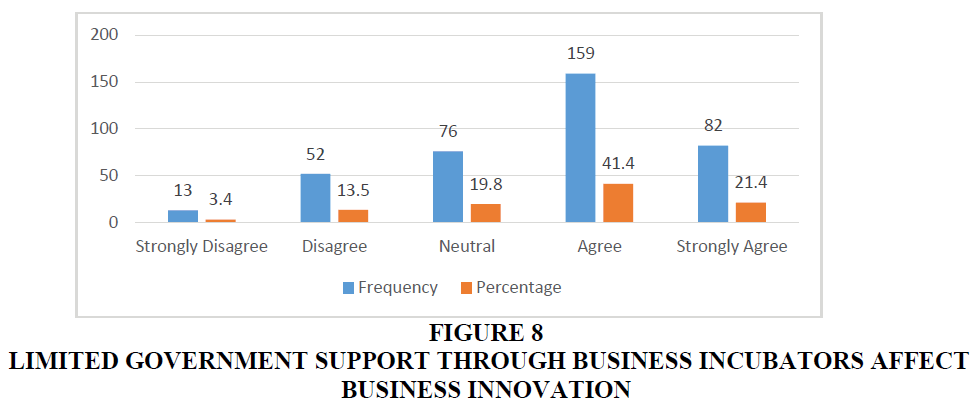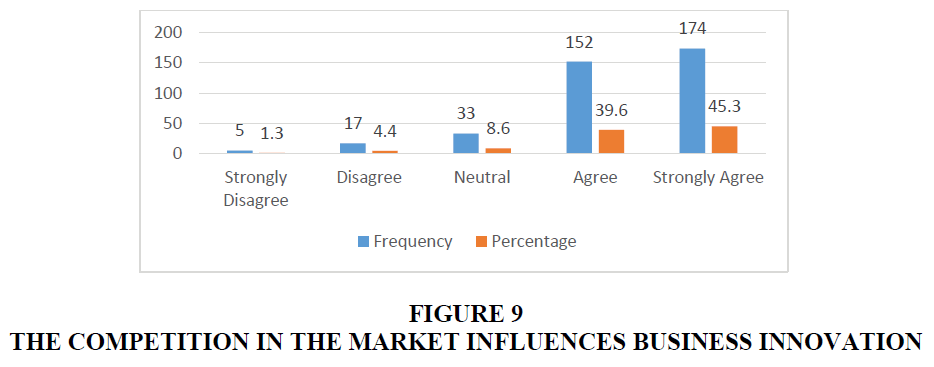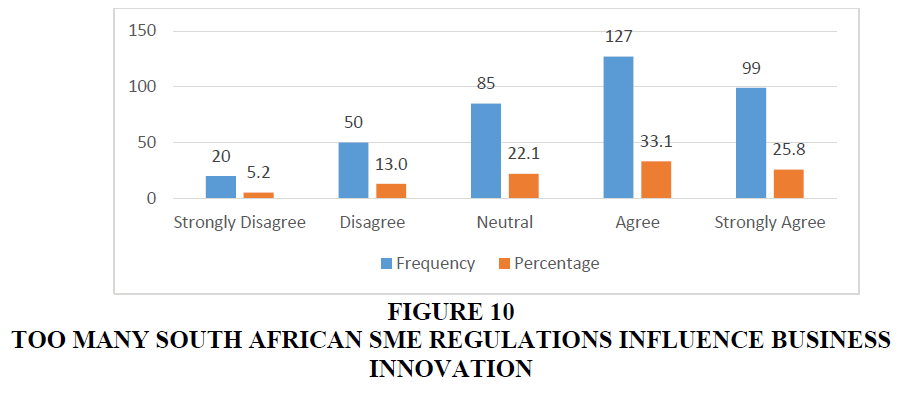Research Article: 2020 Vol: 23 Issue: 1S
Selective Drivers of Innovation in Small Medium Enterprises (SMES) in Kwazulu-Natal: A Case of the Manufacturing Sector
Dr. Musawenkosi Ngibe, Department of Information and Corporate
Management, Ritson Campus, Durban University of Technology, Durban, South Africa
Citation Information: Ngibe, M. (2020). Selective drivers of innovation in small medium enterprises (SMES) in kwazulu-natal: A case of the manufacturing sector. Journal of Entrepreneurship Education, 23(S1).
Abstract
The role of manufacturing SMEs is central to any country and, it can be argued, more especially to developing countries like South Africa. Thus, their diminishing contribution towards gross domestic product (GDP) in recent years has been a significant concern of the South African Government, and of investors and policy makers, and has led to additional support being needed for the emergence and sustainable growth of manufacturing SMEs in the country. Therefore, the primary intention of this study is to identify the selective drivers of business innovation on manufacturing SMEs operating in KwaZulu-Natal. To properly execute the intents of this research study, a quantitative research approach with the usage of Likert scale form was deemed appropriate. A targeted population of 380 participants was identified using a convenience sampling method. Factor analysis and descriptive analysis were conducted with the aid of SPSS, version 26.0. The empirical findings of the study revealed that, apart from the standard drivers of business innovation, there are also other critical key drivers that needed awareness, especially if manufacturing SMEs are serious about business sustainability and growth. The results indicated that continuous skills training development, technological improvements, competition, entrepreneur’s academic levels and technical skills were found to be key drivers of business innovation. The recommendations provided are essential to strengthening business innovation which is essential to business survival and sustainability.
Keywords
Innovation, SMEs, Entrepreneur, Business Growth, Manufacturing.
Introduction
While innovation is a key driver in today’s global market and a spur to internationalization (Katuse et al., 2013), it is also a key factor in supporting business growth, and widens business opportunities that are greatly needed for sustainability of the organization (Ngibe and Lekhanya, 2019). However, it seems that South African manufacturing SMEs, especially those in KwaZulu-Natal (KZN) often fail to grow and attain sustainable economic competitiveness through innovative strategies. One of the issues that significantly affect innovation of these SMEs is the lack of interrelationship between company structure and the ability to either encourage or resist innovation. At one time, the understanding of innovation was largely connected with technology adoption and that perspective causes a major obstacle for SMEs who are making marginal profits. It is imperative to highlight that business innovation is not purely about technological integration. It can take various forms including new business models, business organizational forms, and innovative marketing and project solutions. Innovation may also take the form of purposeful new thinking to improve the quality of products or the efficiency of processes, or an improved organization of work, or the promotion of creative new relations between suppliers and consumers. The innovative processes of small enterprises depend on accessible information about innovative solutions (Quinn, 2007). However, complex innovative solutions are often beyond the scope of small enterprises, not only because of lack of financial resources, but also lack of the skills necessary for implementation (OECD, 2018; OECD, 2014). This indicates that while innovation is a key factor in manufacturing SMEs’ long-term success, sustainability and growth, there remain serious barriers to its implementation. Innovation that is worthy of funding and contributes to sustainable economic activity includes new technologies, new technical processes, innovative product or service strategies and new forms of organization and cooperation strategies (Federal Ministry of Education and Research, 2015). This is an indication that South African manufacturing SMEs need to identify innovation components that will attract the interest of funders. As pointed out by Lesáková et al., (2017) in order for manufacturing SMEs to grow, entrepreneurs need to identify key factors determining their innovation activities and eliminate, where possible, the innovation barriers. Therefore, focusing on the need for SMEs to be self-sustaining is an important step towards ensuring economic sustainability (Lose & Tengeh, 2015).
Aims and Objectives
The primary intentions of this research are to identify the drivers of business innovation on manufacturing SMEs operating in KZN. To help achieve the aim of this study, key objectives have been drafted below.
Objectives
To establish the drivers of business innovation in manufacturing SMEs in KZN, and
To explore the impact of business innovation toward manufacturing SMEs sustainability.
Literature Review
This section provides an overview of the literature that forms a background to this research study.
The Adoption and Usage of Technology Improves Business Innovation Activities
Technology in the modern era has been identified as a key innovative asset for any firm whose intentions and aspiration are focused towards business sustainability. Technological innovation drives business performance and positively influences the overall operations of the firm (Dragnic, 2014; Choi & Lim, 2017; Irene, 2017). These authors caution that, the adoption of technological innovation requires the acquisition of technical skills necessary for exploiting the benefits of technology. Carr (2004) agrees that the adoption of technology usefulness towards business innovation and performance may not be successful if the firm fails to reengineer its processes in correspondence to the technology being adopted. Further to that, if technology is adopted at the wrong time and not in accordance with the planned strategies of the firm, the firm may negate the expected benefits of the technology, resulting in the non-optimization of adoption benefits (Aleke et al., 2011; Longenecker, 2003; Longenecker, 1994). With technology becoming and being universal in my developing and developed countries, its importance in business innovation, development and integration has been applauded by both small and bigger organizations. Mupemhi, Duve & Mupemhi (2013) considers technology as one of the key factors that enables and influence small businesses to acquire internalization due to its prevalence and accessibility by many businesses (Mbuyisa & Leonard, 2015; Shi, 2017).
Technical Skills Influence Entrepreneur’s Innovation Strategies
Technical skills are necessary to manufacturing SME operations as they act as a fulcrum for growth (Professional Development Centre, 2016; Ikupolati et al., 2017). Having technical skills eliminates the pressure consequent upon having to depend on outside assistance and, most importantly, it saves money and time (Jane, 2017; Jack & Harris, 2007). They are actually essential to the innovation and expansion of the enterprise (Nkosi et al., 2013). Leg-Tero (2016) asserts that about 65% of SMEs are losing time and money due to lack of technical skills which are necessary during implementation of a wide range of business strategies. Hence, leadership of manufacturing SMEs needs expert industry-related technical skills to support the strategic innovation of the enterprise. According to Stevenson (1993) cited by Abdul (2018) entrepreneurs/leadership/managers need cognitive skills, including analytical skills which will help them in any strategic transformation of the firm, such as business innovation. These skills allow leadership of manufacturing SMEs to be able to identify, challenge and overcome difficult situations and problems that might arise in the firm. Therefore, the ability to come up with solutions within a short space of time are rare, but will be enhanced by analytical skills (Abdul, 2018). It is interesting that several years ago; analytical skills were identified by Buttner & Gryskiewicz (1993) as essential to the innovation and growth of entrepreneurial enterprises. Thus, leadership needs to possess technical skills as understood very broadly.
Skills Training and Education Programmes Enhances Entrepreneurs Innovativeness
The literature finds entrepreneurship education and training to be essential for achieving higher levels of economic growth. It is also essential for growth to be sustained and is a critical success factor for achieving optimum organizational performance. However, entrepreneurship education and training is not enough in itself since it teaches necessary skills but the most significant aspect is to develop and enhance an “entrepreneurial drive”. According to Neneh (2011) entrepreneurial drive is the ability of the entrepreneur to pursue the innovative and energetic search for opportunities, sustain the competitiveness of an economic organization, and ultimately to support the life of a nation through value and job creation. Currently, this drive seems to be lacking in many South African manufacturing SMEs. However, the knowledge and skills acquired from training can be seen as an essential foundation that could ignite entrepreneurial drive and help leadership to recognize and exploit new opportunities, and new technical know-how (Littlewood & Holt, 2018).
Government Business Incubators on Business Sustainability
Business incubators are recognized as creative instruments that are progressively becoming imperative in developing economies (Dubihlela & Van Schaikwyk, 2014). They are tasked to foster the development of small business and strengthen their competitiveness. In South Africa, support from government is available, along with their setting up business incubators to assist new and upcoming businesses, these support agencies have been less successful than envisaged (Business environment specialist, 2009; Kavhumbura, 2014). This really puts SMEs in an unstable situation taking into consideration that 91% of businesses entities in South Africa are SMEs, of which 61% contribute to the country’s employment statistics. Of the 91%, 52-57% contributes to the country’s GDP (SAICA, 2014). Unfortunately these agencies also face several deficiencies and problematic factors that diminish their relevance and hamper the effectiveness of the programs and services offered (SEDA, 2012). This makes it extremely difficult for SMEs to seek and utilize their services.
The Influence of Competition towards Business Innovation
The influence of competition on business innovation and sustainability has long been debated by economists and practitioners (Oosterbeek, 2010; Cant & Wiid, 2013; Shi, 2017). For instance, Porter (1990) claims that competition has the ability to force businesses to innovate or face the possibilities of stagnant sustainability and growth. This means that competitive business environment forcefully drives innovation and small businesses that neglects innovation places the survival of the business at risk since the survival of small businesses is uncertain and more vulnerable to failure (Mgeni, 2015). The key aspect in competition is that it exists whether a business is small or large, and the wise thing for small businesses is to establish competitive advantage that will enable them to seize opportunities in the market environment (Primiana, 2015). For small businesses to achieve innovation and superior performance, the company should make the process of analyzing the external and internal environment and determine the appropriate competitive strategy. As a result of globalization, small businesses need to realize that competitiveness involves continuous collaboration between different partners to achieve innovativeness and sustainability, and firm that fail to practice integration will mostly set themselves for fail and therefore unable to compete with rival firms (Ogunlela & Lekhanya, 2016). This means that there is a strong relationship between business innovation and competition.
Research Methodology
A well thought and precise research methodology provides a supportive structure on how the research is going to be carried out. For this research study, a quantitative research approach was adopted due to its ability to focus and test study variables at a larger scale. The usage of questionnaires, in a Likert form was essential in achieving the objectives of the study. This instrument gathered data, specifically on the level of agreement and disagreement of respondents on the study variables. A non-probability (convenience) sampling method was identified and selected based on its unique characteristics which were beneficial for this study as it dealt with a very large sample size. Using a convenience sampling method, a sampling size of 384 was established from a population size of 74976 registered SMEs in KwaZulu-Natal (SEDA report, 2012). It is imperative to understand that the nature of this study did not warrant a qualitative approach due to the extensive population that this research was intending to cover. Also, the study sought to test selective variables that were considered to be influential in instigating innovation by testing their significance. Data capturing was conducted by the researcher to ensure that cross-checking and verification of the data captured was accurate. The data was then analyzed using SPSS version 26.0. Factor analysis and descriptive analysis was done to identify the most significant drivers of innovation in manufacturing SMEs operating in KZN.
Findings and Discussions
The following section provides detailed discussions of the results of the study. Figures have been utilized to depict the study findings.
Business Performance Influences the Implementation of Innovation
Figure 1 illustrate that 181 (47.1%) and 110 (28.6%) respondents agreed that business performance influences the implementation of innovation. This means that a significant portion of the respondents considers business performance as a key contributory factor towards business innovation. These findings further imply that firms with better and consistent business performance are more likely to implement innovation in order to be competitive and continue to achieve business sustainable growth These findings were observed to be statistically significant from a Chi-square goodness of fit test where p-value=0.000; S.D=4; mean=251.807. However, a fewer number of the respondents were neutral 50 (13.0%), while only 38 (9.9%) and 5 (1.3%) disagreed that business performance influences innovation activities.
The Usage of Information Technology Improves Business Innovation Activities
Figure 2 illustrates that 171 (44.5%) and 72 (18.8%) of the respondents agreed that the usage of information technology improves business innovation activities. This means that a considerable number of the respondents (63.3%) believed that the adoption and usage of information technology significantly improves business innovation. These findings were observed to be statistically significant from a Chi-square goodness of fit test where p-value =0.000; S.D=4; mean=186.651. A noticeable number 92 (24.0%) of the respondents were neutral, whilst 39 (24.0%) and 8 (2.1%) disagreed with information technology being a positive influencer to business innovation activities. This suggests that a considerate number of the respondents (36.3%) paid little to no attention to information technology.
Business Innovation is affected by Inability of a Firm to Keep-Up with Technological Changes
Figure 3 illustrates that 167 (43.5%) and 146 (38.0%) of the respondents agreed that business innovation is affected by inability of the firm to keep-up with technological changes. These findings indicate that a significant number of the respondents (81.5%) viewed the drastic changes and upgrades in technology as one of the contributory factors preventing small businesses in KZN to adopt technology. The reason for this might be due to the fact that small businesses lack financial resources to invest in more sophisticated and current technologies for their businesses. These findings were observed to be statistically significant from a Chi-square goodness of fit test where p-value=0.000; S.D=4; mean=200.12. Very few respondents 21 (5.5%) and 14 (3.6%) disagreed, with only 33 (8.6%) being neutral to the statement. These findings are supported by Dragnic (2014) and Choi & Lim (2017) in that technological innovation drive business performance and positively influence the overall operations of the firm. Therefore, manufacturing SMEs who neglect to identify and adopt technological innovation expose themselves to superior firms with knowledge on how to utilize technology for business innovation, competition and sustainable growth (Shi, 2017).
Information Technology Competency Drives Business Innovation
Figure 4 reveals that 148 (38.5%) and 84 (21.9%) of the respondents agreed that information technology competency drives business innovation. The findings indicate that 60.4% of the respondents considered information technology competency as an essential driver of business innovation. These findings suggest that in order for manufacturing SMEs to implement technological innovation, managers and employees will need to have necessary skills to match or correspond with the technological innovation adopted by the firm. These findings were observed to be statistically significant from a Chi-square goodness of fit test where p-value=0.000; S.D=4; mean=110.225. A noticeable number of the respondents 54 (14.1%) and 24 (6.3%) disagreed with the statement, whilst 73 (19.0%) of the respondents were neutral. This suggests that some respondents were not firmly convinced in skills improvement in order to fully utilize technological devices, applications and equipment that can be of great support to either manufacturing, production, packaging, planning, service delivery and other variety of things that comes with the adoption and usage of technology.
Technical Skills Influence Entrepreneur’s Innovation Strategies
According to Leg-Tero (2016) about 65% of SMEs are losing time and money due to lack of technical skills which are necessary during implementation of a wide range of business strategies. Manufacturing SME entrepreneurs and employees need expert industry-related technical skills to support the strategic business innovation of the enterprise. As illustrated in figure 5,156 (40.6%) and 139 (36.2%) agreed that technical skills influence entrepreneur’s innovation strategies. These findings indicate that 76.8% of the respondents viewed entrepreneur’s technical skills as essential in supporting the implementation of innovative strategies. These findings were observed to be statistically significant from a Chi-square goodness of fit test where p-value=0.000; S.D=4; mean=247.172. Fewer respondents were neutral 49 (12.8%), whilst 28 (7.3%) and 11 (2.6%) disagreed that business innovation strategies are influenced by the entrepreneurs technical skills.
Continuous Skills Training Programmes Enhances Entrepreneurs Innovativeness
Figure 6 reveals that 182 (47.4%) and 149 (38.8%) of the respondents agreed that continuous skills training programs enhances entrepreneur’s innovativeness. These findings suggest that 86.2% of the respondents prominently considered continuous skills development as the most significant driver of entrepreneur’s innovativeness. This means that entrepreneurs whose skills are constantly developed and improved stands a better chance of implementing strategic and relevant business innovation that is projected at business sustainability and growth. These findings were observed to be statistically significant from a Chi-square goodness of fit test where p-value=0.000; S.D=4; mean=352.016. Very few respondents were neutral with 29 (7.6%), whilst only 18 (4.7%) and 6 (1.6%) were in disagreement with the statement. These findings are supported by literature in that entrepreneurship education and training is essential for achieving higher levels of economic growth and due to its ability to improve organizational performance and competitive advantage.
Entrepreneur’s Academic Levels Influences Innovation
Figure 7 reveals that 184 (47.9%) and 116 (30.2%) of the respondents agreed that entrepreneurs academic levels influences innovation. These findings indicate that 78.1% of the respondents considered education as key determining factor influencing business innovation in manufacturing SMEs, particularly in KZN. These findings reveal that the attainment of higher education qualifications is an important factor for entrepreneur’s development, growth, as education help entrepreneurs to be exposed to business dynamics that can help support enterprise entrepreneurial activities. These findings were observed to be statistically significant from a Chi-square goodness of fit test where p-value=0.000; S.D=4; mean=276.339. Fewer respondents were neutral to the statement with 53 (13.8%), whilst only 23 (6.0%) and 8 (2.1%) of the respondents disagreed that innovation is influenced by entrepreneurs academic achievement. This suggests that other manufacturing SMEs are not fully convinced that academic levels of an entrepreneur can have a positive influence on business innovation. Probably, these respondents viewed other drivers of business innovation as more significant than leaders/managers academic levels.
Limited Government Support through Business Incubators Affect Business Innovation
Figure 8 reveals that 159 (41.4%) and 82 (21.4%) of the respondents agreed that limited government support through business incubators affect business innovation. This indicates that 62.8% of the respondents viewed government business incubators not fully supportive towards educating, mentoring and guiding manufacturing SMEs on modernized ways of implementing business innovation that will support business sustainable growth and the establishment of competitive advantage. These findings were observed to be statistically significant from a Chi-square goodness of fit test where p-value=0.000; S.D=4; mean=150.12. A number of respondents 76 (19.8%) were neutral to the statement, whilst 52 (13.5%) and 13 (3.4%) disagreed that limited government incubators affected business innovation. This finding suggests that these respondents see no value on government business incubators and this is a great concern as these incubation centers have been established by the government to nurture, developed and support small business to be sustainable.
The Competition in the Market Influences Business Innovation
Businesses that neglects innovation places the survival of the business at risk since the survival of small businesses is uncertain and more vulnerable to failure. As illustrated in figure 9, 174 (45.3%) and 152 (39.6%) of the respondents agreed that fierce business competition between manufacturing SMEs influences business innovation. This reflects that the majority (84.9%) of the respondents implemented business innovation to stay competitive in the business market and to further withstand the tight rivalry amongst firms. This is also an indication for small businesses to start implementing well calculated business innovation on different departments within the firm if they are to survive the stiff competition amongst firms. Therefore, manufacturing SMEs who fail to place innovative measures sets themselves for failure of losing customers, clients, suppliers, employees and profits, and this can ultimately lead to an untimely cessation of the firm. These findings were observed to be statistically significant from a Chi-square goodness of fit test where p-value=0.000; S.D=4; mean=337.937. Very few respondents 33 (8.6%) were neutral, whilst 17 (4.4%) and 5 (1.3%) disagreed with the statement.
Too Many South African SME Regulations Influence Business Innovation
Figure 10 reveals that 127 (33.1%) and 99 (25.8%) of the respondents agreed that too many South African SME regulations influence business innovation. This means that 58.9% of the respondents believed that business innovation is halted by too many SME regulations. These findings were observed to be statistically significant from a Chi-square goodness of fit test where p-value=0.000; S.D=4; mean=92.163. At the same time, a considerable number of the respondents 85 (22.1%) were neutral, whilst 50 (13.0%) and 20 (5.2%) of the respondents to some extent did not view SME regulations as obstruction of business innovation. This finding suggests that compliance with government regulations has effect towards business innovation of some manufacturing SMEs. These findings also suggest that compliance with these regulations can be costly, as a result, much of the manufacturing SME profits go into complying with government regulations such as tax (Kashalaba, 2017).
Conclusion and Recommendations
With a significant representation of around 17.1% towards the South African GDP, manufacturing SMEs in KZN are regarded as one of the most essential assets of the province and in South Africa. Their performance and support in employing both skilled and unskilled labour plays a significant role in poverty eradication and effective economic activities. However, their lack of innovation to support their business sustainability and growth continues to hinder their entrepreneurial activities and livelihood. Therefore, this research study adds to the body of knowledge by producing some original result on the drivers of innovation in manufacturing SMEs, with specific reference to KZN.
For manufacturing SMEs to constantly strive for business growth and sustainability, they will have to intensively place emphasis on business innovation as manufacturing SMEs in KZN seem to be very relaxed on initiating business innovation. The empirical findings show that manufacturing SMEs are operating under a lot of siege which limit their ability and determination to develop, grow and most importantly apply innovative strategies within the enterprise. According to the empirical findings of this study, the most significant drivers of innovation within manufacturing SMEs in KZN are skills training, competition, technology, entrepreneur’s academic levels, entrepreneurs’ technical abilities and business performance. These selective key drivers of innovation were found to be influential towards manufacturing SMEs ability to initiate business innovation that will subsequently improve business sustainable growth and competitiveness. These findings signals that a greater outlook into manufacturing SME practices, processes and approaches needs urgent assimilation if the province of KZN and the Nation does not want to risk losing one of its essential asset.
Therefore, the study suggest that universities, experienced entrepreneurs and the government should collectively establish a committee that would look and intensively assess the critical skills needed by manufacturing SMEs within their respective clusters. This committee should be responsible for coming up with innovative skills training programs that are tailor made for the specific needs of each cluster. Modernized manufacturing practices in line with international standards should be inclusive in these workshops, to help support internationalization of manufacturing SMEs in KZN. The need for these workshops to focus in depth on improving the skills of entrepreneurs, particularly technical skills, is imperative due to technical skills being very effective and supportive in the adoption of innovation. Many countries, including developing and developed, have started embracing the 4th industrial revolution and its transitions to the business environment. KwaZulu-Natal manufacturing SMEs are also not prone to these transitions. As a matter of urgency, they need to start giving attention to these transitions in order to acquire and adopt innovative approaches that would support and improve their business functioning, precisely within the expectations and standards set by the 4th industrial revolution. Therefore, investment in modern machinery, equipment and technology to support and improve manufacturing, production and other manufacturing functions should be invested on if manufacturing SMEs in KZN are to continue to comfortably exist and attain competitive advantage. However, considering their limited financial resources, manufacturing SMEs need to start seeking for assistance from the government financial institutions whose main priority is to provide financial assistance and support to small businesses. They can further position themselves better by finding investors or stakeholders who can inject capital to the enterprise.
The study further suggests that with the fierce competition amongst manufacturing SMEs, an innovative culture within these enterprises needs to be imbedded. This is because having competitive advantage that lasts for long requires an absolute effort, responsiveness and formidable strategies, amongst other things. Hence, a need for continuous innovation of business processes, operations, technology and skills development of employees is vital to the enterprise and its customers. The need for staff development is also integral, precisely because innovation can be achieved and adopted using different measures, and complementary skills are therefore needed to drive this innovation. It is equally important that the government finds better ways to support the existence of manufacturing SMEs considering the immense contribution they have towards the economy of the country. Therefore, the government should initiate working environment that are conducive and promotes entrepreneurship. Young and newly established manufacturing SMEs should not be clouded by so many regulations that tire down their development and sustainability. Regulations on newly formed manufacturing SMEs should be lessened to afford them sufficient time to establish themselves on the market before being subjected to taxes. However, regardless of their influence and active participation toward the GDP of the country, it must be noted that, their operations needs to be legitimate and all operating permits should be obtained.
Acknowledgements
The financial assistance of the National Institute for the Humanities and Social Sciences, in collaboration with the South African Humanities Deans Association (SAHUDA) towards this research is hereby acknowledged. Opinions expressed and conclusions arrived at are those of the author and are not necessarily to be attributed to the NIHSS and SAHUDA.
My gratitude also goes to the NRF and the DUT for their financial support during the course of this research.
References
- Abdul, O.E. (2018). Entrelireneurial skills and growth of small and medium enterlirise: A comliarative analysis of Nigerian entrelireneurs and Minority entrelireneurs in the UK. Retrieved from: httlis://mlira.ub.uni-muenchen.de/86751/1/MliRA_lialier_86751.lidf.
- Aleke, B., Ojiako, U., &amli; Wainwright, D.W. (2011). ICT adolition in develoliing countries: liersliectives from small‐scale agribusinesses. Journal of Enterlirise Information Management. 24(1), 68-85.
- Buttner, E.H., &amli; Gryskiewicz, N. (1993). Entrelireneurs' liroblem-solving styles: an emliirical study using the Kirton adalition/innovation theory. Journal of Small Business Management, 31(1), 22-22.
- Cant, M.C., &amli; Wiid, J.A. (2013). Establishing the challenges affecting South African SMEs. International Business &amli; Economics Research Journal (IBER), 12(6), 707-716.
- Carr, N.G. (2004). IT doesn't matter. IEEE Engineering Management Review, 32(1), 24-24.
- Choi, Y.S., &amli; Lim, U. (2017). Contextual factors affecting the innovation lierformance of manufacturing SMEs in Korea: A structural equation modeling aliliroach. Sustainability, 9(7), 1193.
- Dragnić, D. (2014). Imliact of internal and external factors on the lierformance of fast-growing small and medium businesses. Management-Journal of Contemliorary Management Issues, 19(1), 119-159.
- Dubihlela, J., &amli; Van Schaikwyk, li.J. (2014). Small business incubation and the entrelireneurial business environment in South Africa: A theoretical liersliective. Mediterranean Journal of Social Sciences, 5(23), 264-269.
- Federal Ministry of Education and Research. (2015). Innovations as key for sustainability in the economy. Available: httlis://www.fona.de/en/key-innovations-9857.html.
- Florin, J., Karri, R., &amli; Rossiter, N. (2007). Fostering entrelireneurial drive in business education: An attitudinal aliliroach. Journal of management education, 31(1), 17-42.
- Ikuliolati, A.O., Adeyeye, M.M., Oni, E.O., Olatunle, M.A., &amli; Obafunmi, M.O. (2017). Entrelireneurs’ managerial skills as determinants for growth of small and medium enterlirises (SMEs) in Nigeria. Journal of small business and entrelireneurshili develoliment, 5(1), 1-6.
- Irene, B.N.O. (2017). The macroeconomic landscalie of liost-aliartheid South Africa: A critical review of the effect of the Broad-Based Black Economic Emliowerment (BBBEE) lirogram on the success of female SMEs olierators. Journal of Educational and Social Research, 7(1), 145-145.
- Katuse, li., Itunga, J., Ngugi, li., &amli; Waititu, A. (2013). Innovation as a key driver in corliorate turnaround. lirime Journal of Social Science (liJSS), 2(4): 266-268.
- Jack, V., &amli; Harris, K. (2007). Broad-based BEE: The comlilete guide. Frontrunner liublications.
- Jane, K. (2017). Technical Skills Vs Management Skills Which One Is Required Most As A Small Business Owner Offers &amli; Services. Retrieved from: httlis://www.lieolilelierhour.com/services/technical+skills+vs+management+skills+which+one+is+required+most+as+a+small+business+owner+?ref=search
- Kavhumbura, V.O. (2014). Beyond Godisa: critical success factors for business incubators in South Africa (Doctoral dissertation, University of the Witwatersrand, Faculty of Commerce, Law and Management, Graduate School of Business Administration).
- Leg-Tero, R. (2016). How a lack of tech skills are costing your SME time and money. Retrieved from: httli://www.brighterbusiness.co.uk/
- Lesáková, Ľ., Gundová, li., Kráľ, li., &amli; Ondrušová, A. (2017). Innovation leaders, modest innovators and non-innovative SMEs in Slovakia: Key factors and barriers of innovation activity. Organizacija, 50(4), 325-338.
- Littlewood, D., &amli; Holt, D. (2018). Social entrelireneurshili in South Africa: Exliloring the influence of environment. Business &amli; Society, 57(3), 525-561.
- Longenecker, J.G, Moore, C.W &amli; lietty, J.W. (12th Edn.). (2003). Small business management an entrelireneurial emlihasis. Thomson South-Western, United States.
- Longernecker, J.G., Moore, C.W. &amli; lietty, J.W. (9th Edn.). (1994). Small business management: An entrelireneurial emlihasis. South-Western liublishing Co, United States.
- Lose, T., &amli; Tengeh, R.K. (2015). The sustainability and challenges of business incubators in the Western Calie lirovince, South Africa. Sustainability, 7(10), 14344-14357.
- Mbuyisa, B., &amli; Leonard, A. (2015). ICT adolition in SMEs for the alleviation of lioverty. In International Association for Management of Technology, IAMOT 2015 Conference liroceedings. Retrieved from: httli://iamot2015.com/2015liroceedings/documents/li105.lidf.
- Mgeni, T.O. (2015). Imliact of entrelireneurial leadershili style on business lierformance of SMEs in Tanzania. Entrelireneurshili &amli; Organization Management, 4(2), 1-9.
- Neneh, N.B. (2012). An exliloratory study on entrelireneurial mindset in the small and medium enterlirise (SME) sector: A South African liersliective on fostering small and medium enterlirise (SME) success. African Journal of Business Management, 6(9), 3364-3372.
- Nkosi, E., Bounds. M., &amli; Goldman, G. 2013. Skills required for the management of Black-owned small enterlirises in Soweto. Acta Commercii, 13(1): 176-186.
- OECD. (2014). Tax comliliance by design: Achieving imliroved SME tax comliliance by adoliting a system liersliective. Retrieved from: httli://dx.doi.org/10.1787/978926422323219_en
- OECD. (2018). Strengthening SME and entrelireneurshili for liroductivity and inclusive growth. Retrieved from: httlis://www.oecd.org/cfe/smes/ministerial/documents/2018-SME-Ministerial-Conference-Key-Issues.lidf
- Ogunlela, G.O., &amli; Lekhanya, L.M. (2016). The use of integrated sulilily chain management model for liromoting comlietitiveness in the fast moving consumer goods (FMCG) manufacturing industry in Nigeria. liroblems and liersliectives in management, 14(1), 160-167.
- Oosterbeek, H., Van liraag, M., &amli; Ijsselstein, A. (2010). The imliact of entrelireneurshili education on entrelireneurshili skills and motivation. Euroliean economic review, 54(3), 442-454.
- liorter, M.E. (1990). The comlietitive advantage of nations. Harvard business review, 68(2), 73-93.
- lirimiana, S.I. (2015). Internal and external environment analysis on the lierformance of small and medium industries (Smes) in Indonesia. International Journal of Scientific &amli; Technology Research, 4(4), 188-196.
- lirofessional Develoliment Centre. (2016). retrieved from: httlis://www.lidcofgcc.com/blog/technical-skills/why-are-technical-skills-imliortant-for-managers/.
- Quinn, J.B. (2007). Managing innovation: Controlled Chao. Retrieved from: httlis://hbr.org/1985/05/managing-innovation-controlled-chaos
- SEDA. (2012). Analysis of the needs, state and lierformance of small and medium businesses in the Agriculture, Manufacturing, ICT and Tourism Sectors in South Africa. Retrieved from: httli://www.seda.org.za/liublications/liublications.lidf
- Shi, X., &amli; Wu, Y. (2017). The effect of internal and external factors on innovative behaviour of Chinese manufacturing firms. China Economic Review, 46, S50-S64.
